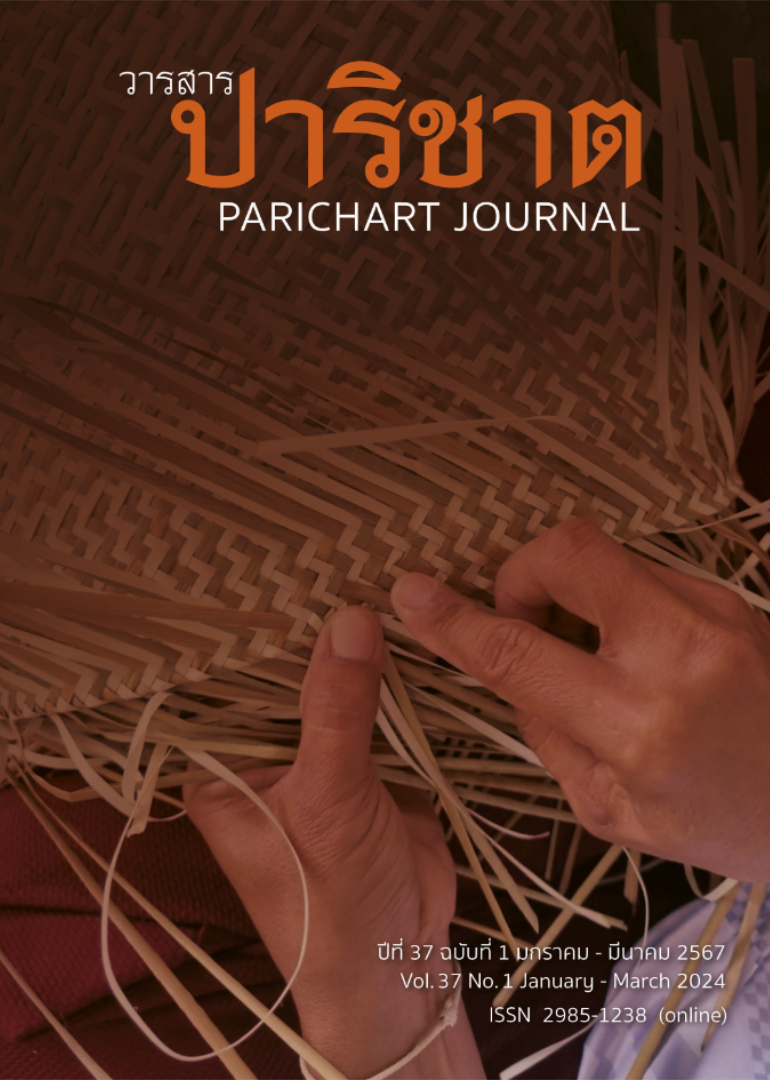Developing Entrepreneurial Skills for Vulnerable Students in Pattani
Main Article Content
Abstract
This research article aimed to develop entrepreneurial skills of vulnerable students by means of action research. The study site was one of the ragged schools in Pattani Province. The Sample group was a total of 30 secondary school students which was selected by a purposive sampling method. The process of entrepreneurial skills development was adhered to the action research spiral which was comprised of 4 stages: 1. plan 2. act 3. observe, and 4. reflect. Duration of the study was 12 months (May 2022 - May 2023). The measurement and evaluation of the entrepreneurial skill development was done at the end of developmental process, by using competency assessment forms. The results exhibited that the student’s capability for all three dimensions was at good level. The average scores for entrepreneurial attribute, knowledge, and skill were 3.65 (from the full score of 5), 12.93 (from the full score of 20), and 32.50 (from the full score of 42), respectively. Our research results illustrated that even with low socioeconomic status and low background academic performance, these vulnerable students had potential to be developed for higher learning and entrepreneurial competency. A teacher was arguably a desirable change agent in driving that student’ development in learning and entrepreneurial ability. Concerning the country’s situation on poverty and inequality at the present time, entrepreneurship education, particularly for vulnerable students, could be proposed as a policy for the reduction of generational poverty.
Article Details

This work is licensed under a Creative Commons Attribution-NonCommercial-NoDerivatives 4.0 International License.
References
Office of the National Economic and Social Development Council. (2022). Poverty and inequality report 2021. NESDC. (In Thai)
Wongmontha, O. (2019). Effect of crisis in the three southern border provinces on community economy: A case study from Muang District, Pattani Province. Rusamilae Journal, 40(1), 95-99. (In Thai)
Equitable Education Fund. (2023). Education as an accessible option for all people and fitting in with life’s need. Bookdance Studio. (In Thai)
Bangkok Post. (2023, March 23). Dropout rate concerns Unicef. https://www.bangkokpost.com/thailand/general/2533941/dropout-rate-concerns-unicef?view_comment=1
Bell, R., & Bell, H. (2020). Applying educational theory to develop a framework to support the delivery of experiential entrepreneurship education. Journal of Small Business and Enterprise Development, 27(6), 987-1004.
Leon, R. D. (2017). Developing entrepreneurial skills. An educational and intercultural perspective. Journal of Entrepreneurship, Management and Innovation, 13(4), 97-121.
Blesia, J. U., Iek, M., Ratang, W., & Hutajulu, H. (2021). Developing an entrepreneurship model to increase students’ entrepreneurial skills: An action research project in a higher education institution in Indonesia. Systemic Practice and Action Research, 34(1), 53-70.
Salun, M., Zaslavska, K., Vaníčková, R., & Šindelková, K. (2021). Formation of entrepreneurial skills in students in a changing world. In SHS Web of Conferences (Vol. 90, p. 02009). EDP Sciences.
Office of the Education Council. (2018). Entrepreneurship education (Research Report). ONEC. (In Thai)
Lertwathanawanit, S. (2017). The Development of activities for learner’s development by project-based learning to enhance career skills and career attitudes for high school students [Master’s thesis, Silpakorn University]. (In Thai)
Leeumnonkul, P., & Thongthiw, S. (2010). Research and development of the junior entrepreneur curriculum-based on cognitive apprenticeship approach to enhance business competence of upper secondary school students. Silpakorn Educational Research Journal, 2(1), 141- 153. (In Thai)
Sudkeaw, S. (2020). A Study of the entrepreneur professional skill Learning of the Office of Non-formal Education and Informal Education in the non-formal context of Thailand [Master’s thesis, Mahidol University]. (In Thai)
Rattanalert, W. (2018). Strategy for developing a potential of teacher in business filed in order to foster entrepreneurial capability of students studied in the schools belonged to the secondary educational service area office 16 (Research Report). Secondary Education Service Area 16 Office. (In Thai)
NIA Academy MOOCs. (n.d.). STEAM4INNOVATOR. https://moocs.nia.or.th/course/stream4innovator
Eltanahy, M., Forawi, S., & Mansour, N. (2020). Incorporating entrepreneurial practices into STEM education: Development of interdisciplinary E-STEM model in high school in the United Arab Emirates. Thinking Skills and Creativity, 37, 100697.
Kemmis, S., & McTaggart, R. (1988). The Action research planner (3rd ed.). Deakin University, Australia.
Osterwalder, A., & Pigneur, Y. (2010). Business model generation. John Wiley & Sons.
Matichaon Online. (2017, October 2). STEM education for the development of youth entrepreneurship. https://www.matichon.co.th/education/news_673106 (In Thai)
Ahmad, J., & Siew, N. M. (2021). Development of a children entrepreneurial science thinking test for STEM education. Journal of Baltic Science Education, 20(4), 528-545.
Retnowati, L., Sugianto, S., & Alimah, S. (2021). The development of integrated biology-entrepreneurship learning design-based STEAM. Journal of Innovative Science Education, 10(2), 124-129.


